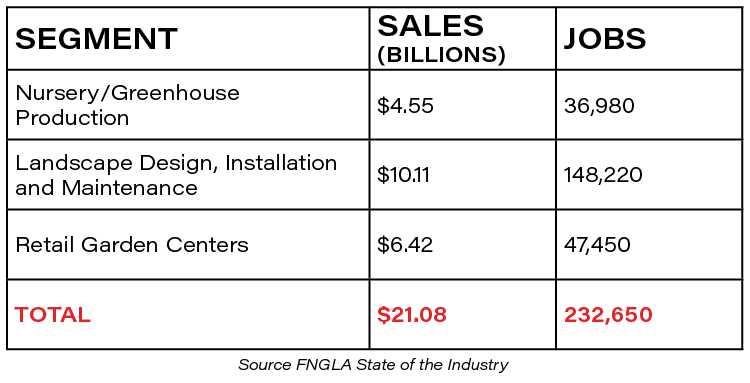Growing Green?
While industry demand grows, available workers slows.

Horticulture-related jobs are vital to Florida’s economy. According to the FNGLA’s latest State of the Industry report, sales in 2015 for the horticulture industry were at $21.08 billion dollars, which is a 37% increase in total output since the last economic study was completed five years ago. These statistics showcase that not only is the green industry expanding, but they represent a growing portion of Florida’s estimated $789.8 billion total GDP; the fourth-largest in the nation. However, finding and retaining skilled labor continues to be a concern as the labor pool grows more shallow.
According to private business owners, the fastest growing jobs within the green industry are landscape construction, landscape maintenance, pesticide application, and irrigation jobs. However, business owners are in a unique quandary; as industry demand grows, they cannot find a steady supply of workers willing to fill positions. Labor shortages are increasing due to both foreign and domestic issues. The increase in the construction market dilutes the labor pool for landscape and horticultural trades. Furthermore, in the span of only a few generations, Mexican fertility rates have plummeted from seven children to two children per female, drastically reducing the population that has fed much of the US industry’s labor in the past decades. Decreases in the amount of available labor coupled with tightening immigration laws equals inadequate numbers of foreign labor to meet the need. Unfortunately, due to declining youth Agriculture programs and the lack of interest in the industry, there are not enough domestic workers to fill the labor gap.
 As the housing market continues to rebound, horticulture businesses project high confidence levels for job growth. It is paramount for businesses to adapt to address the various needs of their workforce. Comprehensive education creates valuable workers, and many businesses are willing to empower their employees with advanced training and certifications. Technological advances, such as automation, makes hard work more efficient and expedient for employees and eases labor shortages. As the green industry continues to grow, business owners must rely on technology, effective recruitment, and retention of skilled workers to meet future industry demands.
As the housing market continues to rebound, horticulture businesses project high confidence levels for job growth. It is paramount for businesses to adapt to address the various needs of their workforce. Comprehensive education creates valuable workers, and many businesses are willing to empower their employees with advanced training and certifications. Technological advances, such as automation, makes hard work more efficient and expedient for employees and eases labor shortages. As the green industry continues to grow, business owners must rely on technology, effective recruitment, and retention of skilled workers to meet future industry demands.
